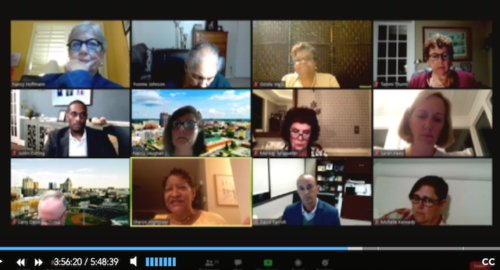The Greensboro City Council is holding a work session on Tuesday, Sept. 1 on the “Housing GSO, Creating Opportunities to Build A Better Community” report.
This is the second work session the City Council has scheduled for this report. The first was on Tuesday, Aug. 18, but because the report is 35 pages long, covers a lot of territory and was one of two reports on housing on the agenda for the one hour and 15 minute work session, the City Council ran out of time to discuss the report in any detail.
The recommendations in the Housing GSO report come with a $50 million price tag, and the report itself took over a year for HR&R consultants to prepare, which seems to require more than a hurried discussion.
When this second work session on affordable housing was being scheduled at the regular meeting on Aug. 18, Councilmember Justin Outling asked if some work sessions could be scheduled on economic development and jobs. He said that at the City Council retreat in February one of the goals was to increase household income and noted that some of the communities’ largest employers had moved and that small businesses were facing unique challenges because of COVID-19.
Outling said that the City Council needed to hear from its partners in economic development including the Greensboro Chamber of Commerce.
The actual goal set by the City Council back in February, according to the minutes, was to “raise per capita median household income by 15% by 2025.”
Some of the other goals that didn’t have to do with affordable housing were to reduce violent crime by 20 percent by 2022, bring the fund balance to 15 percent of the annual budget by 2023, increase by 20 percent the number of people who can reach their place of employment without the use of their personal vehicle by 2023 and implement a plan to receive the gold LEED award for cities by 2023.
The goal for affordable housing the City Council is now concentrating on is to form partnerships to increase commitments to built affordable housing in the 0 to 30 percent and the 30 percent to 60 percent of Area Median Income by 1,000 units by 2022.


I hope they begin with designating what amount is considered affordable. Greensboro is already coming in under the national and state housing cost averages by multiple analyses on websites like Roofstock & Homesnacks. When the data indicates that we are so affordable already, what is it that is making housing not affordable? I hope the city council answers that question as well.
If the answer is low wages, then I also hope they take the time to reconcile why making inexpensive housing is the solution versus getting more employers in the area causing competition for labor (i.e. higher wages). Perhaps that is a no go because they don’t want to bring in any business that may increase the usage of personal vehicles.
There are multiple ways to make housing affordable and it doesn’t necessarily mean making inexpensive housing. One could argue that it is better to lift people up economically so that housing becomes affordable versus depressing/lowering the bar.
I think the Council should live in the affordable housing.